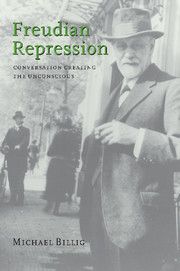Book contents
- Frontmatter
- Contents
- Acknowledgements
- 1 Introduction
- 2 The importance of repression
- 3 Thinking, speaking and repressing
- 4 Language, politeness and desire
- 5 Oedipal desires and Oedipal parents
- 6 Remembering to forget
- 7 Words of unconscious love
- 8 Repressing an oppressed identity
- 9 Ideological implications
- References
- Subject index
- Name index
7 - Words of unconscious love
Published online by Cambridge University Press: 22 September 2009
- Frontmatter
- Contents
- Acknowledgements
- 1 Introduction
- 2 The importance of repression
- 3 Thinking, speaking and repressing
- 4 Language, politeness and desire
- 5 Oedipal desires and Oedipal parents
- 6 Remembering to forget
- 7 Words of unconscious love
- 8 Repressing an oppressed identity
- 9 Ideological implications
- References
- Subject index
- Name index
Summary
According to Freudian theory, the objects of repression tend to be emotional impulses. Inappropriate and shameful feelings of love and aggression have to be driven from the mind, to prevent these impulses from seriously disturbing the person's sense of their moral worth. The Oedipal story exemplifies this. The Oedipal child resolves its complex by acquiring a moral sense that demands the repression of earlier erotic and aggressive desires. This moral sense is, according to Freudian theory, represented by the superego, located within the ego and constituting ‘an agency which unceasingly observes, criticizes and compares, and in this way sets itself over against the other part of the ego’. Henceforward, this unceasing observation, criticism and comparison will result in the constant repression of shameful emotions. What is repressed does not disappear, but is relegated to the realm of the unconscious. We are said to continue desiring in shameful ways, feeling shameful things, but we cease to be aware of these feelings. Thus, Freudian theory assumes the reality of repressed emotions.
The idea of an unconscious emotion seems to be troubling, much more so than the idea of an unconscious memory. Forgetting the past is familiar in ordinary life. So is remembering something, which we thought we had forgotten. When we do so, it is easy to suppose that the ‘memory’ must have been there all along, even though we were not aware of it.
- Type
- Chapter
- Information
- Freudian RepressionConversation Creating the Unconscious, pp. 184 - 215Publisher: Cambridge University PressPrint publication year: 1999



